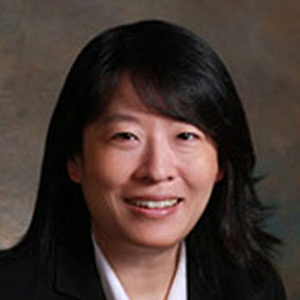In order to expedite clinical diagnostics and advance precision patient care, innovative developments in algorithm development and imaging sciences, combined with improved understanding of the complex biology of cancer is crucial. This session will cover various developments, needs, and opportunities of expedited clinical decision-making.
Session Chair Profile
Biography
Dr. Yuh is a neuroradiologist and physicist who interprets images of the brain, neck and spine as attending physician at UCSF and at Zuckerberg San Francisco General Hospital. Recently she was a leader of a team of UC Berkeley computer scientists and UCSF radiologists who developed a deep learning algorithm that identifies tiny abnormalities on clinical head CT scans with accuracy comparable to highly-trained physicians. She also led FDA approval in 2019 of the first-ever imaging biomarker to select patients likely to have poor outcome after traumatic brain injury, for inclusion in therapeutic clinical trials, under the FDA’s Medical Device Development Tool (MDDT) program. A 2002 graduate of Stanford University School of Medicine, she completed training in radiology and neuroradiology at UCSF in 2009. She has been nominated for the UCSF Exceptional Physician Award, and is a prior Outstanding Teaching Fellow of the UCSF Department of Radiology and Biomedical Imaging.
Talk
Developing Expert-Level AI For Imaging In Brain Emergencies
Continued increases in medical imaging mean physicians now evaluate thousands of images per typical workday. AI could be an answer, but physicians train for years to gain expertise to read these images. This talk describes the development of an AI to rival experts at interpreting head CT, a common study performed worldwide.
Speaker Profile
Biography
Dr. Hassanpour’s research is focused on developing intelligent computational methods to capture and organize unstructured biomedical information in a structured format to advance translational research and clinical practice. Dr. Hassanpour’s research laboratory works on building novel machine learning, natural language processing, and image analysis methods to extract clinical and health-related insights from medical records and images to improve diagnosis, prognosis, and targeted therapies. Before joining Dartmouth, he worked as a Research Engineer at Microsoft on high-throughput semantic text analysis for Web search queries for more than two years. Dr. Hassanpour received his Ph.D. in Electrical Engineering with a minor in Biomedical Informatics from Stanford University and a Master of Math in Computer Science from the University of Waterloo in Canada.
Talk
Deep Learning For Histology Image Analysis
With the recent expansions of whole-slide digital scanning, archiving, and high-throughput tissue banks, the field of digital pathology is primed to benefit significantly from deep learning technology. This talk will cover new deep-learning-based methods for pathology slide analysis which have shown promising results for histologic characterization of the slides.
Speaker Profile
Biography
Aaron Y. Lee MD MSCI is focused on the translation of novel computation techniques including deep learning for automated diagnosis and to uncover new pathophysiologic mechanisms in routine clinical data from large electronic health databases. His main areas of research include age-related macular degeneration, diabetic eye disease, and macular telangiectasia. He has published over 50 peer reviewed manuscripts and editorials. Dr. Lee is an assistant professor and vitreoretinal surgeon at University of Washington, Department of Ophthalmology. He has served on the American Academy of Ophthalmology Medical Information Technology Committee and the American Academy of Ophthalmology IRIS Analytics Task Force. Dr. Lee received his BA in Biochemistry from Harvard University. He then completed his MD and Masters of Science in Clinical Investigations from the Washington University of St Louis. After an internship at St. John’s hospital, he returned to Washington University to complete his ophthalmology residency. He then completed two fellowships: a medical retina fellowship at Moorfields Eye Hospital in London, and a vitreoretinal surgical fellowship at the University of British Columbia in Vancouver Canada.
Speaker Profile
Biography
Eric Kriegstein is the CEO of Respirix, a company developing a hardware and software platform to manage cardiopulmonary health. Previously, Eric was a Principal at Signatures Capital, a San Francisco based fund that was an early investor in Google, Uber, Masimo, DropBox. He started his career as an analyst at Khronos LLC, where he managed an alternatives portfolio of over $1 billion. Eric holds a B.A. in Economics and Philosophy from Columbia University, and an M.B.A. from UCLA Anderson.
Talk
Non-Invasive Monitoring of Hemodynamics through Breaths: Cardiospire
Lower cost and higher performance sensors, cloud connectivity and novel computational approaches have ushered a new era in monitoring and managing patient health. This talk will cover how one startup is leveraging these advances in conjunction with an overlooked physiological signal to solve some of cardiology's most pressing challenges.















